Notice
The purpose of this page is to publish an interview with KOKIA for archival purposes that was originally published free of charge on a web page. However, we will promptly delete the page upon request from the copyright holder.
Source
- Original URL: http://musicpool.jp/special/nicetomeetyou/kokia.html (dead link)
- Source URL: a backup in WebArchive (in Japanese)
About the interviewer
This interview was conducted as the second installment of the interview series by Ai Kawashima (川嶋あい), who is a singer-songwriter. Her first single “Asu e no tobira” (“The door to tommorw”) is one of representative songs of the group “I WiSH” where Ai Kawashima is a member of the group. Moreover, the song “Tabidachi no hi ni” (“On the day of departure”) written by her is one of the best songs that is often sung at graduation ceremonies at schools.
Nice to meet you — written by Ai Kawashima — Vol 2. (2011/05/17)
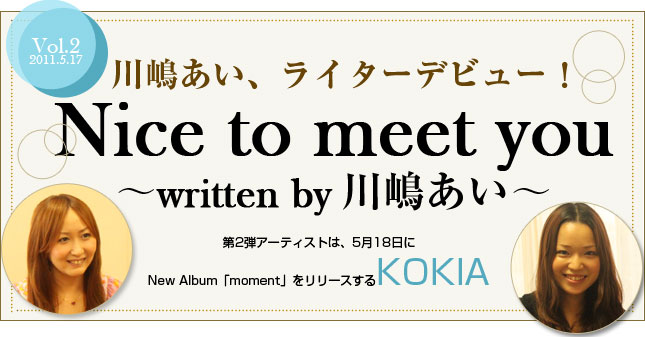
The singer-songwriter Ai Kawashima has been interviewing hot artists! In this second installment of the series, she is joined by KOKIA, who has released a new album “moment”, which challenges the use of a special recording technique. What will the two female singers, who both write lyrics and music, have to talk about? We can’t wait to hear what they have to say!
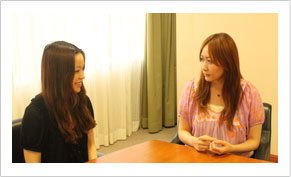
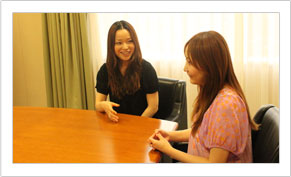
Ai Kawashima (Kawashima, hereafter): Hello! Let’s start this interview with a light topic. What are you most interested in outside of work right now?
KOKIA: Now I am interested in aromatherapy. Eventually, I would like to get a certification of aromatherapist. We musicians are approching something invisible throught out the job, aren’t we? I thought that aromatherapy has something in common with music in the sense that, although we cannot see it, it works on the brain and mind. So, I started aromatherapy. I brought my own blend of aroma oil with me today.
Kawashima: Wow!
( We talked for a while about the history of aromatherapy and its detailed mechanisms. )
Kawashima: We lost track of time and got to talking about aromas! It’s like an aromatherapy course now [laughs].
KOKIA: But aromatherapy is a very deep field, and in the end, it is studied even in the fields of anatomy and physiology and the brain. So the general image of aromatherapy is slightly different from the soft impression that girls seem to like or that they can smell nice aromas. When I get certified as an aromatherapist, I would like to perform at my concerts with aromas burning in the background.
Kawashima: Lovely! Do you usually listen to music while burning aromas at home?
KOKIA: No, I don’t listen to music very often at home actually. I am usually in a job where I listen to a lot of sound, so I guess I prefer to be in a soundless situation in my personal life. I don’t watch much TV either. I don’t like the unique tension of TV programs. I also can’t do anything while doing something, like listening to music or watching TV.
Kawashima: I see. But I can understand a little. It’s hard to concentrate while doing something, isn’t it? Well, let’s get down to the main part, shall we? Let me ask you about your new album “moment”. What really surprised me was that the entire album was recorded on stage. What made you decide to take on this kind of challenge?
KOKIA: This year marks the fifth anniversary of my independence from the music label that I have belonged to. The independence was a very big milestone for me, and every moment of that period was so precious that I wanted to make a special album to mark this milestone. And then, I began to think about what kind of album would be most unique to KOKIA. What I have felt strongly over the past few years is that while it is of course important to leave behind a work in CD form, the stage is a place that I want to cherish even more than that. So I decided to record an album in the form of a stage recording to capture the music of that moment on stage in the form of a CD.
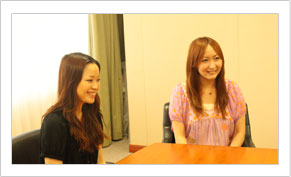
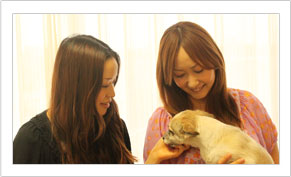
Kawashima: How did you proceed with the stage recording?
KOKIA: This recording is different from what we call a live album. It might be closer to the image of having the audience watch the recording process. So we played on stage in a concert hall with headphones on and the band in a circular formation. In the front rows of the audience, we had monitor seats like you would normally find in a studio, and the engineers were on standby to record. After the performance, we would join the audience in the monitor seats reproduced in the auditorium to check the performance. This album was made with an emphasis on one-shot recording.
Kawashima: I am sure that the tension must be very difficult.
KOKIA: Yes, I experienced a sense of tension that I had never experienced before. Of course, I had to concentrate. So after the recording, I felt not only physical fatigue but also mental fatigue [laughs]. I realized once again that being a musician is a profession with many athletic elements.
Kawashima: Were all the songs on the album written specifically for this album?
KOKIA: Yes, they are. I wrote most of them in the first three months of this year.
Kawashima: By the way, do you often write songs at night? Or during the daytime?
KOKIA: I wrote some songs during the daytime, which is rare this time, but I usually write songs at night. From magic hour to nighttime.
Kawashima: I can only write at night, like you. Although it is a time that I have a lot to think about things, I write songs between midnight and 2 a.m. So the next question. What is the most important message you wanted to convey in this album?
KOKIA: As the title “moment” suggests, I wanted to express someting that should be called “moment”. I think that people are motivated or attracted by something momentary that can never be detained. I like the lyrics of the title track, “The past and the future are helping each other hand in hand.” I think that the future is prepared and ready not to forget the sad and painful things, but to accept everything. I made this album with the idea that I want to live our lives by accepting each moment of our daily lives. I think I was able to express this well with the recording method.
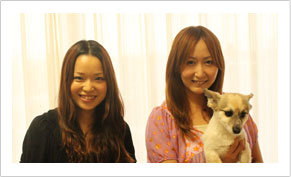
Kawashima: The title track “moment” is one that left a particularly strong impression on me. Did writing this song change you mentally?
KOKIA: I think there was. Every time I finish writing a song, I get my mind sorted out.
Kawashima: I understand that feeling very well. I think I can find my own answers by writing songs.
KOKIA: I would like to cherish the seeds that have sprouted within me and plant them on stage for the audience.
Kawashima: I’m glad I was able to learn and hear so much today. Thank you!